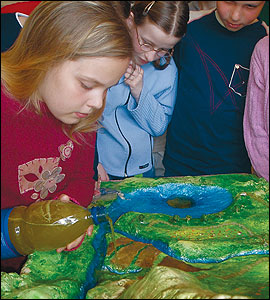 |
Small grants with big impactsThe Danube Regional Project's Small Grants Programme is helping to support projects that target the reduction of hazardous toxins and pesticides from the Danube River Basin. |
 |
School children get up
close to study a model of
the Morava River Basin
in Slovakia to understand
river dynamics such as
flooding and mixing. |
The few houses scattered near the Hnilec River 75 km outside Kosice, Slovakia, are like many distant rural settlements. They find it hard to get EU or national funding to clean their wastewater, as most such funding goes to large cities and large treatment plants.
"Our system fills the gap," says Project Manager Robert Zvara of the NGO 'Creative'. "It's inexpensive, environmentally-friendly and low maintenance, so it's helpful not only for distant communities in Slovakia but also throughout the Danube Basin." The system sends household sewage through pipes funded by the local municipality to improved settling tanks and a newly constructed reed bed that removes nutrients – without using electricity! "The quality of output water released to the creek doubles national standards and helps maintain the quality of the nearby protected EU Natura 2000 meadow lands," says Zvara.
Granting help to reduce pollution.
This 'Creative' project is just one of 60 national projects funded through
the first round of the UNDP/GEF Danube Regional Project’s (DRP) 2
million USD Small Grants Programme for Danube NGOs. The programme focuses
on reducing nutrient and toxic pollution, one of the biggest problems for
the Danube recently confirmed by the ICPDR's Danube River Basin Analysis
(Roof Report 2004). Nutrient pollution has led to poorer water quality and
has helped create a severe ecological imbalance in the Black Sea with many
species heavily impacted. Hazardous toxins and pesticides are also found
throughout the basin, at times in alarming concentrations.
Finding alternatives for farmers.
Further south in post-war Vukovar, Croatia, national grant recipient ' Europe
House Vukovar' is trying to motivate farmers and local authorities to switch
from conventional to organic farming. "Farmers are up against tremendous
barriers here," says Project Manager Novica Grajic. " Unemployment
is 70%. State support for agriculture is low. Local authorities want to
show that farmers are producing again since the war so they want production
to be quick, and that means using lots of pesticides and fertilisers, happily
supported by local 'agricultural pharmacies'. It’s not easy showing
the benefits of organic agriculture, but we need to start somewhere."
Managed by the REC, the grants programme was made available to the 11 countries
of Bosnia and Herzegovina, Bulgaria, Croatia, the Czech Republic, Hungary,
Moldova, Romania, Serbia and Montenegro, Slovakia, Slovenia and Ukraine.
Danube NGOs are now invited to apply for the second round of DRP Small Grants
at the regional level. Regional grants are up to USD 35,000 each. In exceptional
cases, the amount can exceed this limit by 50%. The deadline for submitting
concept papers is September 2, 2005.
For more information, please visit: www.rec.org